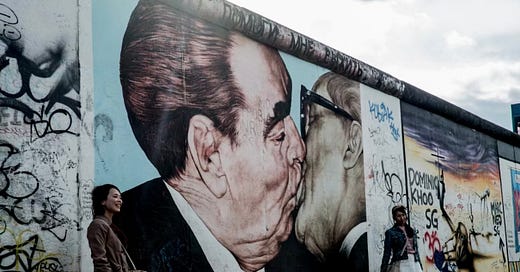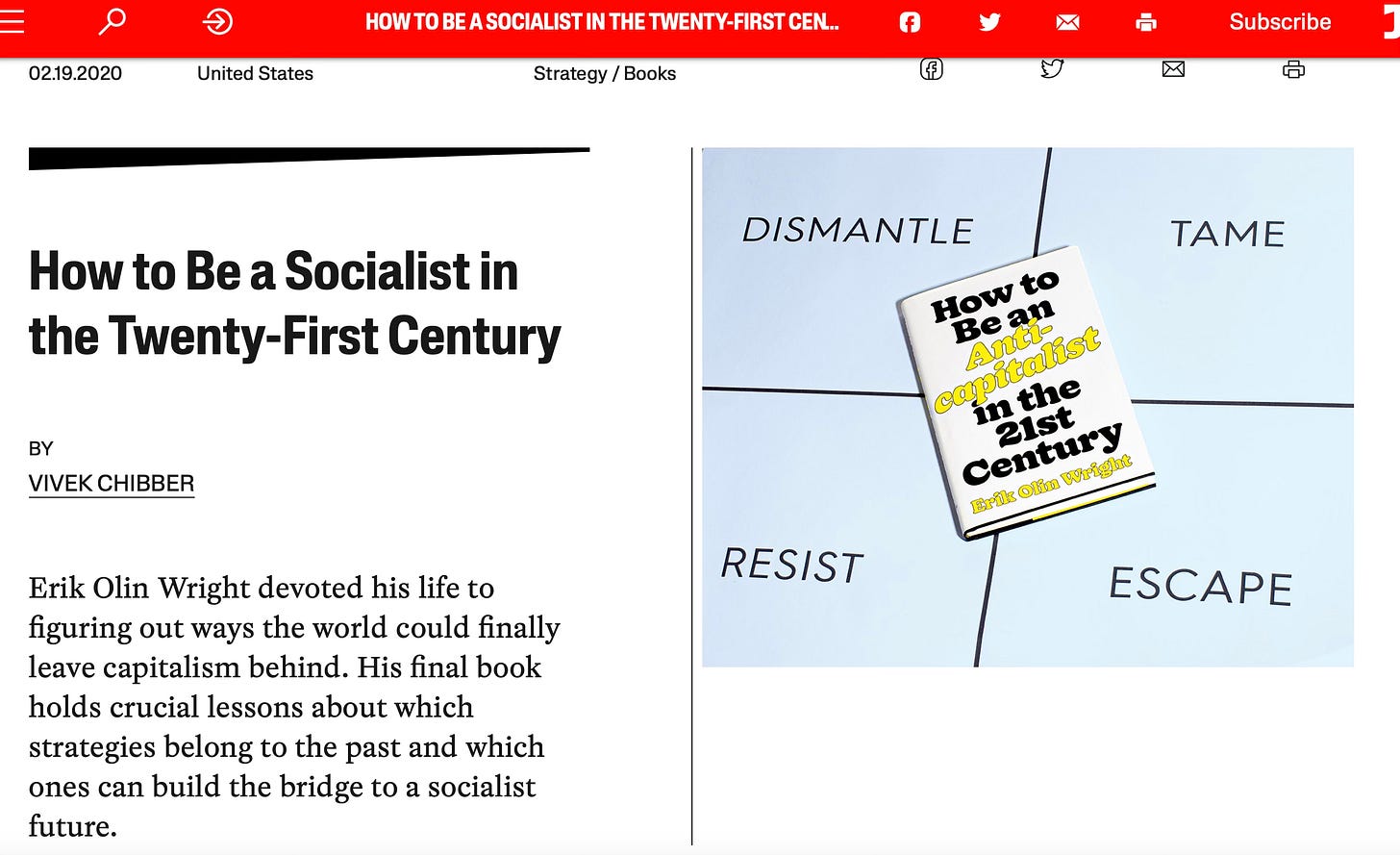Four kinds of Internationalism: from Imago Dei to Globalization
A short essay on the political history of identifying as being human.
Christians are called to fellowship and solidarity across all tribal, national, political and religious boundaries. And because Jesus was so clear on this point, it has always been difficult to reconcile the truth of Christianity with state building, military power, war and even the regular operation of Church bureaucracy in proximity to political power. On the other hand, as
pointed out in conversation with Justin Brierley (on his wonderful podcast) this has always been the case. Even St Patrick, he pointed out, must have been making some kind of accommodation with the local Celtic warlords. At the same time, many of the most cherished, but also taken for granted, aspects of Western and modern civilization could only have emerged in the relatively pacified spaces of specifically Christian states in Europe. I’m not talking only of Cathedrals, stained glass, iconography, literature and music. But also those more Hobbit-scaled, rural churches loved by Kingsnorth, as well as the habits of mind that engendered hospitals, equality in marriage, alms houses, civil rights, habeas corpus and eventually human rights and the welfare state. So although it’s easy to look at Christendom through a purist lens and pull it down on the basis of inconsistency, or for falling short of its own internal morality, this ignores the messy manner in which humanity has always moved forward. This gritty and always compromised reality presents an implicit critique of the ‘sincere’ or left-brain modality that insists on an either/or, acceptance or rejection of truth versus falsity (I’m using terms from McGilChrist and Adam Seligman described here:The kind of political or moral consistency evoked in the sincere mode of 16th century protestant reformers is mostly unavailable to anyone or any group which actually engages with the world. And even if disengagement has produced some of the most intense and searingly saintly examples of Christian life, most Christians are also called most emphatically to engage with the world. Saint Cuthbert lived as a hermit and became Bishop of Lindisfarne — but 40 years after King and Saint Oswald had won Northumbria for Christianity at the Battle of Heavenfield and subsequently died fighting the pagan Mercian King Penda at Oswestry. It’s impossible to imagine Christianity in Northumbria and what became England without both the hermit and the warrior, both saints venerated throughout the medieval period.
With such complexity in mind, in this short essay, I chart very briefly the recent political history of ethical internationalism as it has emerged from Christian humanism. Later I will use this discussion to develop a more nuanced response to a recent spate of thoughtful critiques of cultural Christianity (by
among others) and specifically of JD Vance’s invocation of Ordo amoris as a justification for nested solidarity and an overtly political Christianity.The Berlin Wall and the ‘Socialist Alternative’
After the 1980s, modern liberal politics became increasingly dominated by identity politics and the decreasing salience of class-based political cleavages. The primary driver was clearly deindustrialization, the devastation of heavy industry, and with it, organized labour. About the time that the Berlin Wall came down, socialist feminist Sheila Rowbotham (Rowbotham et al., 2013) mused on what was left ‘beyond the fragments.’ Postmodern culture and so called post-Fordist economics seemed to have given rise to shifting unstable coalitions of identity-based activist groups organised around gender, sexuality, race, ethnicity and even animal rights. Back then, bereft of a convincing political economic alternative to capitalism, leftist organizations agonized increasingly about language and the dynamics of political participation. Social democratic parties wallowed in a kind of ‘narcissism of process’ — positive discrimination, platforming marginal voices, lesbian and gay caucuses, ‘black sections’ and affirmative action. The shorthand for this new way of doing politics was ‘political correctness.’
This culture war was in lieu of class war – because, for all their talk[1], pamphlets, small circulation red-top papers (“SOOOOOOOSHALIST WORKER”), donkey jackets and revolutionary posturing, anyone with half a brain understood that central planning was a busted flush.
There was no ‘socialist alternative’. In the early 1980s, the British left — Tony Benn, Jeremy Corbyn, the Militant Tendency, the Socialist Workers and numerous factional Trotskyist splinter groups — mounted a passionate if ludicrous rear-guard action against Thatcherism. In their collective narcissism of small differences, the absence of any substantive programme was easy to overlook. Where the left actually took power – Livingstone’s Greater London Council, Graham Stringer’s Manchester, the ‘Militant Tendency’ of Derek Hatton’s Liverpool, and Sheffield under David Blunkett MP – posturing ‘resistance’ gave way to a de facto politics of municipal entrepreneurialism as cities competed for investment in an increasingly free-wheeling global investment landscape. And if they couldn’t win the beauty pageant for corporate investment, they scrambled for flagship sporting events and discretionary state funding directed at supply-side strategies of arts-led regeneration. Whatever this was, it was a long way from ‘municipal socialism’.
Having been a synonym for capitalist villainy, around 1997, globalization became, for the Left, the new internationalism.
By the 1990s, socialists across the Western world had accepted globalization as the de facto framework for politics. They swallowed this pill by reframing it as a version of what socialists have always been about – which is to say ‘internationalism’. Clearly the truly socialist or Marxist understanding of this term was a non-starter. Without a convincing vision of socialist economy, there was no chance of a global working-class revolution.
However much these pale-imitators pored over tracts by Lenin, Trotsky, Bukharin, Luxembourg or Gramsci, or later wannabees like the SWP’s Tony Cliff, André Gorz, or late Soviet-era dissidents such as Boris Kagarlitsky or Rudolf Bahro – not one of them had the foggiest notion of what anti-capitalist modernity might look like, other than the dismal grey failure of ‘actually existing socialism.’ This was why people such as Bahro, a romantic figure-head of the red-green left, retreated into an ill-defined New Age spirituality.
Given this intellectual vacuum, the descent of ‘political correctness’ into the Kafkaesque absurdity of ‘woke’ and intersectionality should not be surprising. There really is not point in recounting the details of this – ‘checking your privilege’, critical race theory, land-acknowledgements, ‘intersectionality’, ‘safe-spaces’ , ‘micro-aggressions’, ‘white supremacy’, ‘patriarchy’ – save to say that: men can’t become women; any departure from colour blind, meritocratic individualism is guaranteed to produce racism; and ethno-tribalism for one must produce tribalism for all.
Internationalism: a trilogy in four parts
However, there is something worthy of note in this story. The intellectual and moral course of Western internationalism has developed in four consecutive phases, namely:
I. Christian universalism and Imago Dei
II. Enlightenment humanism
III. Socialist internationalism
IV. Ultra-progressive, pseudo-humanist nihilism (A.K.A. ‘woke’)
The centre of gravity shifted with each of these developments. But it is not true that phases superseded each other but were rather overlaid. Following the example of Jesus, St Paul was the first internationalist (Internationalism Mark I). Drawing attention to the universal implications of the Imago Dei, he showed how the historical fulfilment of God’s covenant with Israel in Christ’s self-sacrifice made it possible for divisions between tribes (Greek and Jew) to be resolved through recognition of the sacral quality of individuals qua humanity. It was this historical vision of Imago Dei that made the Enlightenment programme of (Hobbes) Locke, Rousseau and Kant — of universal individual rights — even thinkable. Kant’s vision of a humanism rooted in secular reason and epistemological and ontological individualism became the cornerstone of what, retrospectively, we understand as the Enlightenment Project (Internationalism Mark II).
Whilst Christians still maintain the sacral individualism of Imago Dei, liberal modernists construct ambitious global governance architectures predicated on a secular vision of human rights. The liberal ‘humanism without borders’ of the philosophes and ideologues of the French and American revolutions (Mark II) subsequently provided an essential foundation for what became Internationalism Mark III i.e. the project for spreading an anti-capitalist, socialist alternative to capitalism around the world. However, it’s important to recognize that, after Lenin’s ‘New Economic Policy’ (1921), and Stalin’s genocidal project of ‘socialism in one country’ (1929+) this project of socialist internationalism became for the most part pragmatic and defensive (at least outside the opportunities afforded by war). Mao advanced ‘socialism with Chinese characteristics.’ European socialists elaborated and defended national welfare states predicated on strong borders and a combination of means-tested and social insurance benefits that were based upon citizenship i.e. membership of a national community.
In short, Mark III socialist internationalism was, for the most part, secondary to the politics of national societies. For Christians, secular liberals and social democrats alike, this pragmatic assumption of civic-membership was always, at least to some extent, in tension with the universalist ethos of humanism — whether the Christian or Enlightenment version. On the other hand, the enormous gains in welfare and internal solidarity effected under the aegis of the nation-state lent credence to the imperative of not making the perfect the enemy of the good.
Which brings us to internationalism Mark IV — the strangest, most unstable, undesirable and blasphemous incarnation of all. Bereft of a plausible economic model, from the late 1990s the left gave up not only on socialism but also on the idea of national society per se. This was the period in which the European Union, led by a cabal of former Eurocommunists and 1968ers, used European monetary union as a sledgehammer to break-up national social democracies, in favour of ‘closer and closer union.’ Knee-deep in Master’s dissertations on topics relating to post-Fordism, Regulation Theoretical accounts of ‘varieties of capitalism’, the end of the Keynesian Welfare State and a bastardized inversion of the social catholic understanding of subsidiarity, this new breed of gung-ho European bureaucrat sought to weld a continental bloc that could simultaneously compete in the globalizing world economy, whilst creating the basis for an efficient, regulated European welfare state. This project was always incoherent, combining the bureaucratic impulses of Christian/Social Democratic corporatism on the one hand, and a neo-liberal vision of global market society on the other. For an elite so well-versed in Gramsci, the project was also a strange inverse of any counterhegemonic focus on culture as a vehicle for change. Rather, the blunt instruments of the market and the state were to be used to destroy national cultures and force through the acceptance of something entirely new.
This is the only way to understand the sudden embrace of mass immigration under the auspices of multiculturalism. The slow, and fairly successful, integration of migrants within the framework of a strong and cohesive national society was abandoned almost overnight in favour of a wholesale demographic and political gerrymandering. I’m not sure that Sheila Rowbotham had precisely this in mind, but what lay ‘beyond the fragments’ was a rainbow coalition made up of an unstable kaleidoscope of shifting alliances and identitarian-formations that became increasingly esoteric and by the 2020s, completely bizarre (‘Trans/Queers for Palestine’; ‘Furry rights are human rights’ etc.) What they shared was a commitment to nihilistic ‘deconstruction’ of everything tried and tested, bequeathed and otherwise sacred to place-bound ‘communities of fate.’ This project required a wholesale attack on the mythos, shared history and patterns of mutual identification that had been wrought over many generations in the cause of mutual identification and an enduring spirit of national sacrifice. For the progressive left, any vestigial ‘Dunkirk spirit’ was construed as a progenitor of chauvinism and potential national violence.
To be fair, there has always been a tendency on the left to sneer at working class patriotism.
‘England is perhaps the only great country whose intellectuals are ashamed of their own nationality. In left-wing circles it is always felt that there is something slightly disgraceful in being an Englishman and that it is a duty to snigger at every English institution, from horse racing to suet puddings. It is a strange fact, but it is unquestionably true that almost any English intellectual would feel more ashamed of standing to attention during “God Save the King” than of stealing from a poor box.’ George Orwell. The Lion and the Unicorn
For any sociologist worth their salt, it was also a necessary a priori for the kind of exclusive (citizen and membership-based) solidarity and taken-for-granted pooling of fiscal resources required for the welfare state. The progressive left, however, mostly construes such sociologists — from Robert Nisbet in the 1950s and Ernest Gellner in the 1980s to Robert Putnam in the 2000s — as suspiciously ‘cis’ male, white and western. Unwilling to settle for the relatively good if imperfect social compacts of Western liberal democracies, coupled with a commitment to aid and development in the global south, progressives decided to burn the house down. They did this in two ways.
Firstly, there was a concerted programme of ideological indoctrination in schools and universities which sought to deny anything benign about any aspect of Western civilization. This culminated in the now pervasive and crazily incoherent language of decolonization.
Secondly, they opened the borders. Whilst nominally talking the language of working-class solidarity and defending the welfare state, across Europe and the Anglophone world the left sought deliberately to crash the solidaristic ‘we identity’ that made this social compact possible.
I don’t need to rehearse the impact of uncontrolled illegal immigration here (Douglas Murray has been on the case for years). With the impact on wages, pressures on housing and welfare entitlements and ballooning public sector deficits, not to mention endemic terrorism and inter-communal violence — the surprise is that it has taken twenty years for working class voters to recognize their class interest and begin to defect from the left. However, with Brexit, Trump, Reform UK, the AfD and numerous populist parties across Europe, the trickle has become a flood. Across the West, woke progressivism is now beginning to reap the whirlwind. It may be too late to stave off serious internal conflict.
For later…
So this is the backdrop to where we are now. In the next couple of weeks I’m going to use this essay as basis upon which to explore the increasingly vexed problem of cultural Christianity and the relationship between the Church, the state and western civilization. I will develop a constructive critique of recent essays and commentary by, among others, Paul Kingsnorth, Elizabeth Oldfield and Justin Brierley and advance what I hope will be a more nuanced and sympathetic understanding of Christian solidarity, internationalism and humanism in an age where the implosion of taken for granted national solidarities is becoming a real possibility.
Some references for the book worms and history of socialist theory completists
Bahro, R. (1978). The Alternative in Eastern Europe. In Politics & society (Vol. 9, Issue 3). New Left Books,. https://doi.org/10.1177/003232928000900304
Bahro, R. (1982). Socialism and survival : (articles, essays, and talks, 1979-1982). Heretic Books.
Bahro, R. (1985). Building the Green movement. GMP.
Boer, R. (2021). Socialism with Chinese characteristics : a guide for foreigners. Springer.
Carr, E. H. (1970). Socialism in one country, 1924-1926. Penguin Books.
Cliff, T. (1982). Neither Washington nor Moscow : essays on revolutionary socialism. Bookmarks.
Davies, R. W. (1997). Lenin, Stalin and the New Economic Policy, 1921–5 (pp. 135–145). Palgrave Macmillan UK. https://doi.org/10.1007/978-1-349-25420-0_11
Davies, R. W. (Robert W., & Society., E. H. (1998). Soviet economic development from Lenin to Khrushchev. Cambridge University Press.
Gorz, A. (1982). Farewell to the working class : an essay on post-industrial socialism. South End Press.
Kagarlitsky, B. (1990). The dialectic of change. Verso.
Kagarlitsky, B. (1995). The mirage of modernization. Monthly Review Press.
Kagarlitsky, B. (2000). The return of radicalism : reshaping the left institutions. Pluto Press.
Murray, D. (2022). The war on the West (First edition.). Broadside Books.
Nisbet, R. A. (1970). The quest for community. ([rev. ed.].). Oxford University Press,.
Nove, A. (1990). Lenin and the New Economic Policy (pp. 50–70). Palgrave Macmillan UK. https://doi.org/10.1007/978-1-349-10991-3_4
Orwell 1903-1950, G. (1962). The Lion and the Unicorn; Socialism and the English Genius.
Rowbotham, Sheila., Segal, Lynne., & Wainwright, Hilary. (2013). Beyond the fragments : feminism and the making of socialism (3rd ed). Merlin Press.
[1] And full disclosure, to some extent mine also – although my vaccination was complete by the time I finished my PhD in 1985.









